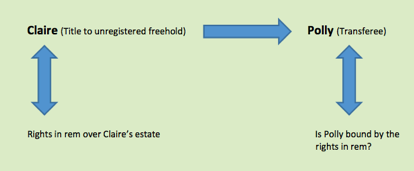As noted before , proprietary rights/interests (i.e. rights in rem) are rights over land which are capable of affecting third parties.
Here we discuss the circumstances in which a right in rem over an unregistered freehold estate in land will bind a transferee (i.e. a purchaser or donee) of the freehold estate.

THE POSITION PRIOR TO 1ST JANUARY 1926
1) Legal rights in rem (i.e. legal proprietary rights/interest) bind 3rd parties (transferees/purchasers) automatically.
- In other words, if you buy unregistered land you will be automatically bound by the legal rights in rem attached to the land.
- This will materialise even if the transferee (i.e. purchaser) has no notice of the right in rem. In other words, the purchaser of unregistered land will be bound by legal rights in rem over the land even if he/she was not aware of their existence. Although, it is unlikely the purchaser will not be aware of the existence of a legal right in rem as it would most likely be discovered by the transferee’s (purchaser’s) investigation of title or on physical inspection of the land.
2) Equitable rights in rem will also bind all 3rd parties, except Equity’s darling.
- The following shows where a transferee would not be Equity’s darling(meaning that equitable rights in rem over the land would bind them):
- Where the transferee/purchaser was not bona fide i.e. acted in bad faith.
- Where the transferee/purchaser didn’t purchase the estate for value i.e. the land given to him.
- Where the transferee/purchaser does not hold a legal estate in the land i.e. his freehold or leasehold is equitable.
- Where the transferee had notice of the equitable right in rem.
So we distinguish between legal and equitable rights because before 1926 equitable rights would not bind Equity’s darling but legal rights always bind the transferee/purchaser of property.
Once an equitable right has been defeated by Equity’s darling it cannot subsequently survive against someone who isn’t Equity’s darling (Wilkes v Spooner [1911]).